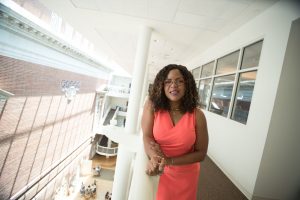Faculty members and senior academic leaders across the university gathered virtually to advance the conversation on inclusive teaching and learning environments at the 31st Academic Affairs Faculty Symposium. The two-day program, Embracing Diversity, Equity, and Inclusion in Teaching and Learning at UGA, was held on Friday, March 26, and Monday, March 29.
The symposium sessions provided opportunities for participants to exchange ideas with administrators and colleagues around campus and reflect on inclusive teaching practices that engage and encourage students who might otherwise feel marginalized and isolated.

The opening session featured keynote speaker Ebony McGee, associate professor of education, diversity and STEM at Vanderbilt University’s Peabody College. McGee pulled data and vignettes from her recent book, Black, Brown, Bruised: How Radicalized STEM Education Stifles Innovation (Harvard University Press, 2020), to lead participants through the many ways that the current education landscape can impede the development of scholars from underrepresented groups.
Attendees received updates on campus-wide diversity, equity and inclusion initiatives and priorities from President Jere W. Morehead, Senior Vice President for Academic Affairs and Provost S. Jack Hu, Vice President for Instruction Rahul Shrivastav and Vice Provost for Diversity and Inclusion and Strategic University Initiatives Michelle Cook. These senior leaders also participated in active Q&A exchanges with faculty.
A panel comprising Angela Birkes, Office of Institutional Diversity; Qiana Wilson, Equal Opportunity Office; Asim Ahmed, Student Government Association; and Chad Mandala, LGBT Resource Center, also responded to faculty questions. Mandala framed his mindset for student interactions as seeing “compliance as the floor and compassion as the ceiling.”
Ginny Boss, assistant professor in the Mary Frances Early College of Education, offered ways that instructors could redesign courses, assignments and syllabi for greater inclusivity. She urged faculty members to “decolonize the syllabus” by seeking creators and exemplars from marginalized backgrounds in readings, providing mentoring, and varying assignments to embrace learning styles and strengths.
More than 50 faculty members participated in small-group breakout sessions to engage in targeted discussion and problem solving around embracing DEI in the classroom, mentoring graduate students for DEI instruction and creating DEI environments for faculty access and success.
Small-group discussions were moderated by Trish Moore, College of Agricultural and Environmental Sciences; Kaori Sakamoto, College of Veterinary Medicine; Holley Schramski, Terry College of Business; and Susan Williams, College of Veterinary Medicine.
These conversations empowered faculty to enrich their own practices in the classroom and to develop goals and suggestions for the larger campus community. A compilation of these observations and recommendations were forwarded to the Provost’s Office.
Members of the UGA Teaching Academy coordinated the symposium with funding support from the Office of the Senior Vice President for Academic Affairs and Provost, the College of Agricultural and Environmental Sciences, and PricewaterhouseCoopers.
The Teaching Academy has provided recordings of the keynote address, “The Cost of Exclusion in Higher Education,” and the lunch address, “Designing a Syllabus that Reflects Your Commitment to Diversity, Equity, and Inclusion,” on the Center for Teaching and Learning and the Teaching Academy websites.
Copies of McGee’s book are available for checkout from the UGA Libraries and CTL.
The 2021 Symposium Planning Committee was chaired by Josef Broder with members Paige Carmichael, Margaret Christ, Melissa Harshman, Mark Huber, Megan Mittelstadt, Naomi Norman, Marisa Pagnattaro and Michele Matthews.


